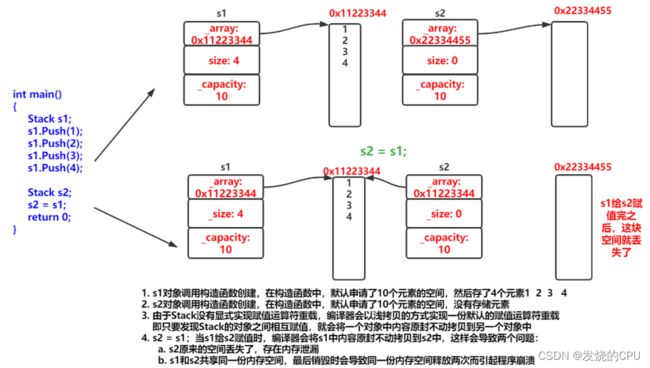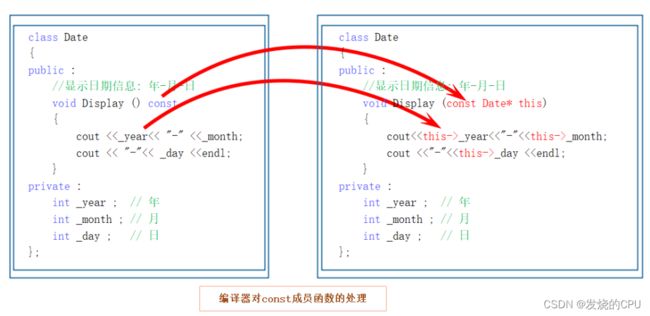轻松拿下——类的默认成员函数
六大默认成员函数:
1、初始化:构造函数主要完成初始化工作
2、清理:析构函数主要完成清理工作
3、拷贝复制:拷贝构造是使用同类对象初始化创建对象
4、拷贝复制:赋值重载主要是把一个对象赋值给另一个对象;运算符重载
5、6、取地址重载:主要是普通对象和const对象取地址,这两个很少会自己实现
目录
一、构造函数
1、概念
2、特性
二、析构函数
1、概念
2、特性:
三、拷贝构造函数
1、概念
2、特性
四、运算符重载
五、赋值重载
六、const成员
七、取地址及const取地址操作符重载
一、构造函数
1、概念
创建类类型对象时,由编译器自动调用,保证每个数据成员都有一个合适的初始值,在对象整个生命周期内只调用一次。
2、特性
(1)函数名与类名相同
(2)无返回值
(3)对象实例化时编译器自动调用对应的构造函数
(4)构造函数可以函数重载
class Date
{
public:
// 1.无参构造函数
Date()
{}
// 2.带参构造函数
Date(int year, int month, int day)
{
_year = year;
_month = month;
_day = day;
}
private:
int _year;
int _month;
int _day;
};
void TestDate()
{
Date d1; // 调用无参构造函数
Date d2(2015, 1, 1); // 调用带参的构造函数
// 注意:如果通过无参构造函数创建对象时,对象后面不用跟括号,否则就成了函数声明
/*Date d3();*/
}(5)如果类中没有显式定义构造函数,则C++编译器会自动生成一个无参的默认构造函数,一旦
用户显式定义编译器将不再生成。
class Date
{
public:
/*
// 如果用户显式定义了构造函数,编译器将不再生成
Date()
{
}
*/
void Print()
{
cout << _year << "-" << _month << "-" << _day << endl;
}
private:
int _year;
int _month;
int _day;
};
int main()
{
// 将Date类中构造函数屏蔽后,代码可以通过编译,因为编译器生成了一个无参的默认构造函数
// 将Date类中构造函数放开,代码编译失败,因为一旦显式定义任何构造函数,编译器将不再生成
// 无参构造函数,放开后报错:error C2512: “Date”: 没有合适的默认构造函数可用
Date d1;
return 0;
}(6)编译器对于内置类型(int char double 指针……)不处理,对于自定义类型(class struct union stack queue person……)会调用他的默认构造函数。
class Time
{
public:
Time()//无参构造函数
{
cout << "Time()" << endl;
_hour = 0;
_minute = 0;
_second = 0;
}
private:
int _hour;
int _minute;
int _second;
};
class Date
{
private:
//基本类型(内置类型)
int _year=2022;//这里不是初始化,是给的缺省值
int _month=11;
int _day=22;
//自定义类型
Time _t;
};
int main()
{
Date d;
return 0;
}
(7)无参构造函数、全缺省构造函数、我们没写编译器默认生成的构造函数,都可以认为是默认构造函数。
class Date
{
public:
Date()//无参构造函数
{
_year = 1900;
_month = 1;
_day = 1;
}
Date(int year = 1900, int month = 1, int day = 1)//全缺省构造函数
{
_year = year;
_month = month;
_day = day;
}
private:
int _year;
int _month;
int _day;
};二、析构函数
1、概念
对象在销毁时会自动调用析构函数,完成对象中资源的清理工作。
2、特性:
(1)析构函数名是在类名前加上字符~
(2)无参数无返回值类型
(3)析构函数不能重载
(4)对象生命周期结束时,C++编译系统自动调用析构函数
class Stack
{
public:
Stack(size_t capacity = 3)
{
_array = (DataType*)malloc(sizeof(DataType) * capacity);
if (NULL == _array)
{
perror("malloc申请空间失败!!!");
}
_capacity = capacity;
_size = 0;
}
void Push(DataType data)
{
_array[_size] = data;
_size++;
}
~Stack()
{
if (_array)
{
free(_array);
_array = NULL;
_capacity = 0;
_size = 0;
}
}
private:
DataType* _array;
int _capacity;
int _size;
};
void TestStack()
{
Stack s;
s.Push(1);
s.Push(2);
}(5)编译器生成的默认析构函数,对自定义类型成员调用它的析构函数。创建哪个类的对象则调用该类的析构函数,销毁哪个类的对象则调用该类的析构函数。
//Date对象销毁时,编译器会给Date类生成一个默认的析构函数,
//Time类是自定义类型也需要销毁,再简接调用Time类的析构函数
class Time
{
public:
~Time()
{
cout << "~Time()" << endl;
}
private:
int _hour;
int _minute;
int _second;
};
class Date
{
private:
int _year = 2022;
int _month = 11;
int _day = 23;
//自定义类型
Time _t;
};
int main()
{
Date d;
return 0;
}(6)如果类中有资源申请时,一定要写析构函数,否则会造成内存泄漏。
三、拷贝构造函数
1、概念
只有单个形参,该形参是对本类类型对象的引用(一般常用const修饰),在用已存在的类类型对象创建新对象时由编译器自动调用。
2、特性
(1)拷贝构造函数是构造函数的一个重载形式
(2)拷贝构造函数的参数只有一个且必须是类类型对象的引用
class Date
{
public:
Date(int year = 1900, int month = 1, int day = 1)
{
_year = year;
_month = month;
_day = day;
}
Date(const Date& d)
{
_year = d._year;
_month = d._month;
_day = d._day;
}
private:
int _year;
int _month;
int _day;
};
int main()
{
Date d1;
Date d2(d1);
return 0;
}(3)默认的拷贝构造函数对象按内存存储按字节序完成拷贝,这种拷贝叫做浅拷贝,或者值拷贝
内置类型是按照字节方式直接拷贝的
自定义类型是调用其拷贝构造函数完成拷贝的
class Time
{
public:
Time()
{
_hour = 1;
_minute = 1;
_second = 1;
}
Time(const Time& t)
{
_hour = t._hour;
_minute = t._minute;
_second = t._second;
cout << "Time::Time(const Time&)" << endl;
}
private:
int _hour;
int _minute;
int _second;
};
class Date
{
private:
int _year = 2022;
int _month = 11;
int _day = 23;
//自定义类型
Time _t;
};
int main()
{
Date d1;
//用已经存在的d1拷贝构造d2,此处会调用Date类的拷贝构造函数
//但Date类并没有显示定义拷贝构造函数,则编译器会给Date类生成一个默认的拷贝构造函数
Date d2(d1);
return 0;
}(4)类中涉及到资源申请时,拷贝构造函数一定要写,即深拷贝
typedef int DataType;
class Stack
{
public:
Stack(size_t capacity = 10)
{
_array = (DataType*)malloc(capacity * sizeof(DataType));
if (nullptr == _array)
{
perror("malloc申请空间失败");
return;
}
_size = 0;
_capacity = capacity;
}
void Push(const DataType& data)
{
// CheckCapacity();
_array[_size] = data;
_size++;
}
~Stack()
{
if (_array)
{
free(_array);
_array = nullptr;
_capacity = 0;
_size = 0;
}
}
private:
DataType* _array;
size_t _size;
size_t _capacity;
};
int main()
{
Stack s1;
s1.Push(1);
s1.Push(2);
s1.Push(3);
s1.Push(4);
Stack s2(s1);
return 0;
}s2对象使用s1拷贝构造,而Stack类没有显示定义拷贝构造函数,则编译器会给Stack类生成一份默认的拷贝构造函数,默认拷贝构造函数是按照值拷贝的,即将s1中内容原封不动地拷贝到s2中,因此s1和s2指向了同一块内存空间。
s2销毁时调用析构函数,空间已释放,s1销毁时再释放一次造成程序崩溃。
(5)拷贝构造函数典型调用场景
使用已存在对象创建新对象
函数参数类型为类类型对象
函数返回值类型为类类型对象
class Date
{
public:
Date(int year, int minute, int day)
{
cout << "Date(int,int,int):" << this << endl;
}
Date(const Date& d)
{
cout << "Date(const Date& d):" << this << endl;
}
~Date()
{
cout << "~Date():" << this << endl;
}
private:
int _year;
int _month;
int _day;
};
Date Test(Date d)
{
Date temp(d);
return temp;
}
int main()
{
Date d1(2022, 1, 13);
Test(d1);
return 0;
}四、运算符重载
函数原型:返回值类型 operator操作符(参数列表)
注:重载操作符必须有一个类类型参数
成员函数的第一个参数为隐藏的this
.* :: sizeof ?: .不能重载
// 全局的operator==
class Date
{
public:
Date(int year = 1900, int month = 1, int day = 1)
{
_year = year;
_month = month;
_day = day;
}
//private:
int _year;
int _month;
int _day;
};
// 这里会发现运算符重载成全局的就需要成员变量是公有的,那么问题来了,封装性如何保证?
// 这里其实可以用我们后面学习的友元解决,或者干脆重载成成员函数。
bool operator==(const Date& d1, const Date& d2)
{
return d1._year == d2._year
&& d1._month == d2._month
&& d1._day == d2._day;
}
void Test()
{
Date d1(2022, 11, 22);
Date d2(2022, 11, 22);
cout << (d1 == d2) << endl;
}
int main()
{
Test();
return 0;
}class Date
{
public:
Date(int year = 1900, int month = 1, int day = 1)
{
_year = year;
_month = month;
_day = day;
}
// bool operator==(Date* this, const Date& d2)
// 这里需要注意的是,左操作数是this,指向调用函数的对象
bool operator==(const Date& d2)
{
return _year = d2._year
&& _month = d2._month
&& _day = d2._day;
}
private:
int _year;
int _month;
int _day;
};五、赋值重载
参数类型:const T&,传递引用可以提高传参效率
返回值类型:T&,返回引用可以提高返回的效率,有返回值目的是为了支持连续赋值
检测是否自己给自己赋值
返回*this:要符合连续赋值的含义
class Date
{
public:
Date(int year = 1900, int month = 1, int day = 1)
{
_year = year;
_month = month;
_day = day;
}
Date(const Date& d)
{
_year = d._year;
_month = d._month;
_day = d._day;
}
Date& operator=(const Date& d)
{
if (this != &d)
{
_year = d._year;
_month = d._month;
_day = d._day;
return *this;
}
}
private:
int _year;
int _month;
int _day;
};赋值运算符只能重载成类的成员函数不能重载成全局函数
class Date
{
public:
Date(int year = 1900, int month = 1, int day = 1)
{
_year = year;
_month = month;
_day = day;
}
int _year;
int _month;
int _day;
};
// 赋值运算符重载成全局函数,注意重载成全局函数时没有this指针了,需要给两个参数
Date& operator=(Date& left, const Date& right)
{
if (&left != &right)
{
left._year = right._year;
left._month = right._month;
left._day = right._day;
}
return left;
}
// 编译失败:
// error C2801: “operator =”必须是非静态成员原因:赋值运算符如果不显式实现,编译器会生成一个默认的。此时用户再在类外自己实现
一个全局的赋值运算符重载,就和编译器在类中生成的默认赋值运算符重载冲突了,故赋值
运算符重载只能是类的成员函数。
用户没有显示实现时,编译器会生成一个默认赋值运算符重载,以值的方式逐字节拷贝(内置类型成员变量直接赋值,自定义类型成员变量需要调用对应类的赋值运算符重载完成赋值)
class Time
{
public:
Time()
{
_hour = 1;
_minute = 1;
_second = 1;
}
Time& operator=(const Time& t)
{
if (this != &t)
{
_hour = t._hour;
_minute = t._minute;
_second = t._second;
}
return *this;
}
private:
int _hour;
int _minute;
int _second;
};
class Date
{
private:
// 基本类型(内置类型)
int _year = 1970;
int _month = 1;
int _day = 1;
// 自定义类型
Time _t;
};
int main()
{
Date d1;
Date d2;
d1 = d2;
return 0;
}// 这里会发现下面的程序会崩溃掉?这里就需要我们以后讲的深拷贝去解决。
typedef int DataType;
class Stack
{
public:
Stack(size_t capacity = 10)
{
_array = (DataType*)malloc(capacity * sizeof(DataType));
if (nullptr == _array)
{
perror("malloc申请空间失败");
return;
}
_size = 0;
_capacity = capacity;
}
void Push(const DataType& data)
{
// CheckCapacity();
_array[_size] = data;
_size++;
}
~Stack()
{
if (_array)
{
free(_array);
_array = nullptr;
_capacity = 0;
_size = 0;
}
}
private:
DataType* _array;
size_t _size;
size_t _capacity;
};
int main()
{
Stack s1;
s1.Push(1);
s1.Push(2);
s1.Push(3);
s1.Push(4);
Stack s2;
s2 = s1;
return 0;
}总之一句话,涉及到资源申请(或需要写析构函数的类)时,一定要写拷贝构造函数或赋值重载函数,以防止内存泄漏和同一块内存空间释放两次。
六、const成员
const修饰类成员函数,实际修饰该成员函数隐含的this指针,表明在该成员函数中不能对类的任何成员进行修改。
class Date
{
public:
Date(int year, int month, int day)
{
_year = year;
_month = month;
_day = day;
}
void Print()
{
cout << "Print()" << endl;
cout << "year:" << _year << endl;
cout << "month:" << _month << endl;
cout << "day:" << _day << endl << endl;
}
void Print() const
{
cout << "Print()const" << endl;
cout << "year:" << _year << endl;
cout << "month:" << _month << endl;
cout << "day:" << _day << endl << endl;
}
private:
int _year; // 年
int _month; // 月
int _day; // 日
};
void Test()
{
Date d1(2022, 1, 12);
d1.Print();
const Date d2(2022, 1, 13);
d2.Print();
}
int main()
{
Test();
return 0;
}七、取地址及const取地址操作符重载
class Date
{
public:
Date* operstor& ()
{
return this;
}
const Date* operator&()const
{
return this;
}
private:
int _year;
int _month;
int _day;
};这两个不常用,使用编译器默认的即可!


